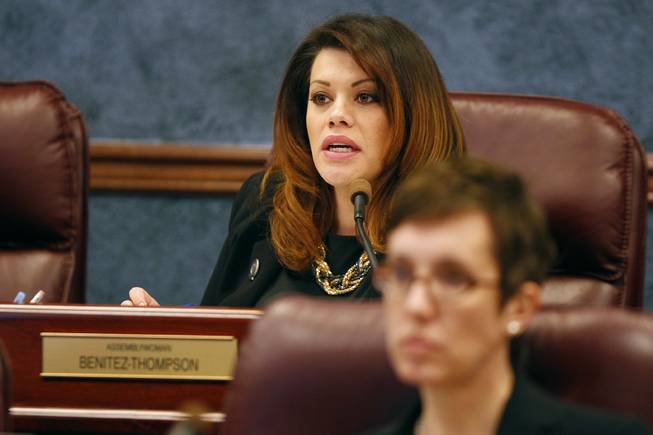
Sam Morris / Las Vegas Sun
Assemblywoman Teresa Benitez-Thompson takes part in a meeting of the Government Affairs Committee on the second day of the 2013 legislative session Tuesday, Feb. 5, 2013 in Carson City.
Tuesday, Feb. 14, 2017 | 2 a.m.
Immigrants in the U.S. illegally would be eligible for a Nevada program that helps victims of violent crime if a bill discussed during a committee meeting at the Nevada Legislature Monday makes it into law.
The Victims of Crime program, administered by the state of Nevada, provides financial help to victims of violent crime in Nevada including assault/battery, sexual assault, domestic violence, physical abuse, child abuse elder abuse, homicide and drunken driving.
However, Nevada law says that in order to qualify for the program the victim must be a resident of Nevada, which it defines as someone who has lived in Nevada for six weeks prior to the crime and is also a citizen or legal resident of the United States.
That citizenship requirement would be deleted by Assembly Bill 122, sponsored by Assemblywoman Teresa Benitez-Thompson, D-Reno, and heard during the Monday Joint Meeting of the Assembly Committee on Judiciary and Assembly Committee on Corrections, Parole and Probation.
“Nevada is only one of a handful of states that does not allow noncitizens to apply for compensation,” Benitez-Thompson said while testifying before the joint committee on behalf of her bill. “Right now we have healthy fund. It’s sitting there, not being put to good use. I think people should be eligible whether or not they have citizenship status here in the U.S.”
Benitez-Thompson, and representatives from the Nevada Coalition to End Domestic and Sexual Violence, the American Civil Liberties Union and Safe Nest testified on behalf of the bill.
The change — Benitez-Thompson and other supporters of the bill said — would help victims of domestic violence better deal with the financial fallout of violent crime. Often, they said, in the wake of a crime, victims who have entered the country illegally feel they have few options other than continuing to live with their abusers.
Supporters of the bill also pointed out that the Victims of Crime program was not a government entitlement program and that it is not funded with tax dollars.
“The fund is funded from fines from federal offenders, forfeited appearance bonds, collateral profits from crimes and assessments and fees as well as gift donations and bequests from private parties," Benitez-Thompson said. "These are not taxpayer dollars. The money comes from fines and fees.”
The Victims of Crime program website lists the following sources of funding for the program:
• Filing fees collected by county justice of the peace
• Court administrative assessments collected for misdemeanor offenses
• Civil penalty revenue received from the Department of Motor Vehicles
• Fines, forfeitures and penalties collected from persons charged with a gross misdemeanor
• Forfeited property proceeds
• Undistributed court-ordered restitution payments
• Inmate wage assessments
Members of the joint committee seemed largely to be in support of the bill.
“I’m shocked that in 2017 we have to do something like this,” Assemblyman Ozzie Fumo, D-Las Vegas, said. “If you’re a human being and you’re a victim of the crime, you should be compensated.”
“I really do support it,” said Keith Pickard, R-Henderson. “I would agree it’s a human rights issue. Where someone comes from should not be a factor when receiving compensation for these crimes.”
Sandra Jauregui, D-Las Vegas, also voiced support for the bill but was concerned that victims who participate in the program may be at risk of being discovered by federal immigration enforcement officials.
“This is a victim’s rights bill, not a citizenship bill,” Jauregui said. “Would we be able to ensure that the victim’s information would not be shared with federal agents?”
Benitez-Thompson said because disbursements from the fund are often administered in partnership with community nonprofit groups, those groups would be in a better position to know if this was an issue.
Committee members also proposed changes to the bill including one that would ensure that crime victims would only have to not obstruct the police investigations into their crimes. Currently, the victims must actually cooperate with law enforcement during the investigation and prosecution.
The hearing ended with Benitez-Thompson promising to work to add those changes to the bill.
